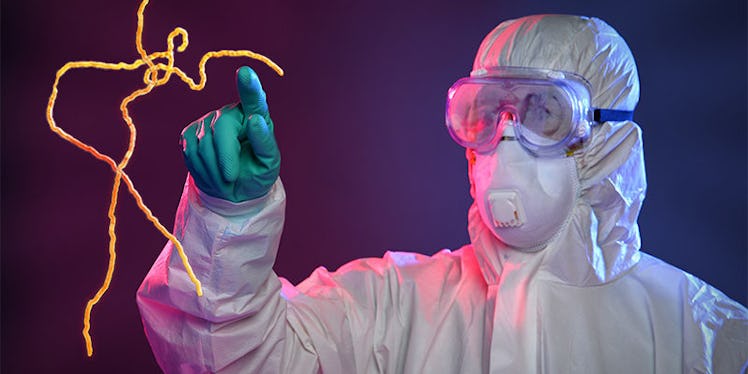
4 Reasons Why You Won't Catch Ebola On The Subway
Ebola has now arrived in New York City, which has prompted fears about the potential of the disease to spread across the city.
It's understandable that this news would be frightening to people. After all, New York is the most populous city in the country, and Ebola is a foreign disease with no cure.
Not to mention, the typical morning commute involves being squished into a confined space with a plethora of strange people. The subway is incredibly convenient, but it's not always the most comfortable. Likewise, it's a hypochondriac's nightmare.
The NYC Ebola patient, Dr. Craig Spencer, reportedly rode the subway before he was hospitalized. He also went bowling.
Despite this fact, New Yorkers are highly unlike to contract Ebola via traveling on public transit, or at their local bowling alley.
Here are four reasons you shouldn't freak out about Ebola on the subway.
1. Dr. Craig Spencer wasn't symptomatic when he used the subway.
Craig Spencer did not show any symptoms of Ebola until just before he was admitted to a hospital. An infected individual is not contagious until he or she begins exhibiting symptoms.
So even if you were sitting right next to Dr. Spencer, it's very improbable that you contracted Ebola.
2. Ebola isn't very contagious.
In order to contract Ebola, you must come into direct contact with the bodily fluids of an infected symptomatic individual: blood, saliva, breast milk, stool, sweat, semen, tears, vomit and urine. Likewise, as Julia Belluz notes for Vox:
'Direct contact' means these fluids need to get into your broken skin (such as a wound) or touch your mucous membranes (mouth, nose, eyes, vagina).
Additionally, unlike the common cold or flu, Ebola is not airborne. Furthermore, sneezing and coughing are not typical symptoms of Ebola, thus an infected individual is unlikely to spread it this way.
Simply put, even if you are on the same subway car as someone with Ebola, you are fairly unlikely to contract the virus.
3. Contracting Ebola isn't an automatic death sentence.
Every American who has contracted Ebola has survived. This disease can be defeated. Seven out of eight Ebola patients treated in the United States have survived.
The one who died, Thomas Eric Duncan, was from Liberia. Duncan's death can largely be attributed to the fact that he was diagnosed late and not quarantined early enough.
While there is no cure for Ebola as of yet, but blood transfusions from survivors appear to be effective.
4. Ebola is far less deadly in America than Africa.
The survival rate for Ebola in the United States is around 80 percent. Comparatively, it's around 30 percent in Africa. There are a number of reasons for this, some of which are political and cultural.
Primarily, people are far more like to survive Ebola in America due to better infrastructure, medical facilities and resources.
This means two things. Firstly, if you contract Ebola in the United States, which is already unlikely, you have a good chance of surviving. Secondly, it's important that the world comes together and helps West Africa contain and defeat this epidemic.
Indeed, in order to prevent further isolated cases of Ebola around the globe, this disease must be combatted where it is most prevalent and deadly.